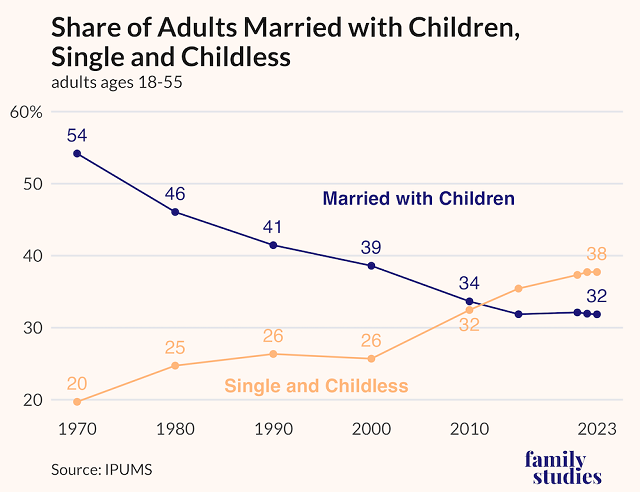“Christmas should be an everyone holiday,” Taylor, a single woman in her mid-30s, told us recently, but “I dread it every year now.”
Even though she loved celebrating Christmas with her family as a child, Taylor doesn’t look forward to the holiday season as a single adult.
“I feel like Christmas is a bit sadder,” she explained, adding that she doesn’t even decorate her apartment in Denver, where she works in digital marketing. “When you don’t have a family (of your own), it’s hard to get into the holiday spirit.”
Taylor feels like Christmas is different for her siblings who are married with children, including how they are treated by their parents.
“My siblings with kids get a lot of attention, support and love. But the single siblings get overlooked, hidden in the chaos of the holidays,” she said. “It kinda takes the magic out of Christmas.” Because she does not have kids, she added, “I don’t feel like an important part of the holiday.”
We first met Taylor in Brad Wilcox’s “Get Married: Why Americans Must Defy the Elites, Forge Strong Families, and Save Civilization,” published earlier this year. She told us then she was worried that she may have missed her chance to have a family because she focused in her 20s on her education and career, not on intentional dating. Like many young people today, she was advised to “finish college, don’t get married too young, go out and see the world … and don’t get too attached to anyone too quickly.”
She took this advice to heart but now she regrets not being more marriage-minded and feels like her life lacks meaning. When we caught up with Taylor this month, she said that while she loves spending time with her nieces and nephews, she longs for a family of her own, especially during the holidays.
Taylor’s experience is emblematic of the growing pattern of “kinlessness” for many American adults today. With rates of marriage and fertility continuing to decline, more and more Americans adults could be facing a kinless future (without a spouse or kids of their own), along with lonelier holidays. In fact, starting in the past decade, the share of “kinless” prime-aged (18-55) adults — defined here as those who are never married and have no children in the home — exceeded the share of Americans who are married with children for the first time in our nation’s history.

This trend is an indication of what we have called “the closing of the American heart,” as fewer young adults take the plunge, get married and start a family. Among the many reasons for the decline in marriage is that more and more young men and women are prioritizing a “Midas Mindset” over a “Marriage Mindset” — that is, focusing on education and work like Taylor did, rather than on love and marriage. Consequently, a growing share of young women and men are slated to never marry. In fact, demographers project that a staggering share of today’s young adults — one in three — will never marry, as the Institute for Family Studies reported.
This decline in marriage is linked to the growing share of Americans who do not have children: in fact, more than 1 in 5 American 50-something adults have never had kids, according to Pew Research Center. Moreover, the share of younger Americans who don’t think they will ever be parents is growing. As Pew reports, “the share of U.S. adults younger than 50 without children who say they are unlikely to ever have kids rose 10 percentage points between 2018 and 2023 (from 37% to 47%).”
Demographer Lyman Stone projects that a record share of today’s young adults will never have children — probably about 1 in 4 men and women in their twenties now will go through life without ever having children.
The repercussions of a kinless future for more American adults extend far beyond a lonely holiday season for the growing share of women and men who have no immediate kin. As the family falls, loneliness rises, deaths of despair surge and the “pursuit of happiness” becomes more unattainable not just for individuals but communities across the nation. That’s because both marriage and parenthood are linked with increased mental and emotional well-being and better overall physical health for both men and women. And while many people today wrongly believe that a satisfying career and a good income are the keys to happiness, the No. 1 predictor of overall life satisfaction is how satisfied people are in their marriage. In fact, as “Get Married” notes, men and women who are happy in their marriages are 545% more likely to be happy in their lives than those who are unhappily married or those who are unmarried.
What’s more, research reported at The Institute for Family Studies by Gallup’s Jonathan Rothwell shows that the benefits of marriage extend to the entire community: “communities are happier when more married people live there and when children are being raised in married households.” Rothwell also found that one of the strongest predictors of deaths of despair — deaths related to suicides, drug overdoses and alcohol poisonings — was the share of married men and women in a community.
We should be more intentional about incorporating our single friends and family into the fabric of our family lives, religious communities, and holiday celebrations.
“Findings like these suggest that today’s young adults are mistaken to prioritize life goals related to work and money over marriage and family life,” as “Get Married” notes. But it’s also true that even many women in their 20s and 30s who are prioritizing finding a spouse are now struggling, like Taylor, to find a suitable partner for marriage because there is a relative dearth of “marriageable men” in their circles who are employed full-time and serious about moving forward with marriage and family life. As Melanie Notkin, author of “Otherhood,” pointed out, many unmarried women today are not single and childless by choice: “It’s not that we did not want to marry. We did. And still do.”
The good news is that today’s young adults and future generations are not doomed to face a kinless future. We can turn the declining fortunes of family life around by doing more as a society to spread the word about the beauty and power of marriage and family life, especially the link between marital happiness and adult flourishing. But this will require that we as parents and educators, along with faith leaders, policymakers and cultural influencers, do a better job of instructing the young people in our lives about the benefits of marriage and parenthood. We can help them to build their own family one day by encouraging them to date more intentionally. Even as we push our kids to get good grades and prepare for successful careers, we should also be talking up the value of being married and raising kids. They deserve to know that forging a path toward a stable family life is as central to their future success as a good education and satisfying job.
At the same time, there is a fine line between becoming more marriage friendly as a society and (wrongly) making our single friends and family feel less valuable because they are alone. The fact is that a growing share of men and women in America today will spend their entire lives kinless. So, even as we extol the beauty of marriage and family life, we should also acknowledge that not everyone can or should get married. This means we should be more intentional about incorporating our single friends and family into the fabric of our family lives, religious communities, and holiday celebrations.
So this week reach out to the single men and women in your circles, inviting them to be part of your holiday celebrations, and make more of an effort to help them enjoy the gift of this season that is “for all mankind.” Let’s welcome them to our Christmas feasts and parties and invite them along to mark the various traditions we enjoy with our children, from viewing Christmas lights to baking treats. As Taylor reminds us, Christmas is for “everyone” — single or married, parent or nonparent. So, let’s all do our part to embrace and encourage our single friends and family this Christmas — even as we intentionally spread the word about the lasting gifts of marriage and children, not just for brighter holidays but for happier adults and flourishing communities.
Alysse ElHage is the editor of the blog Family Studies (www.family-studies.org). Brad Wilcox (@BradWilcoxIFS) is the Future of Freedom Fellow at the Institute for Family Studies and a non-resident senior fellow at the American Enterprise Institute.
Editor’s Note: This article appeared first at Deseret News. It has been republished here with permission.
